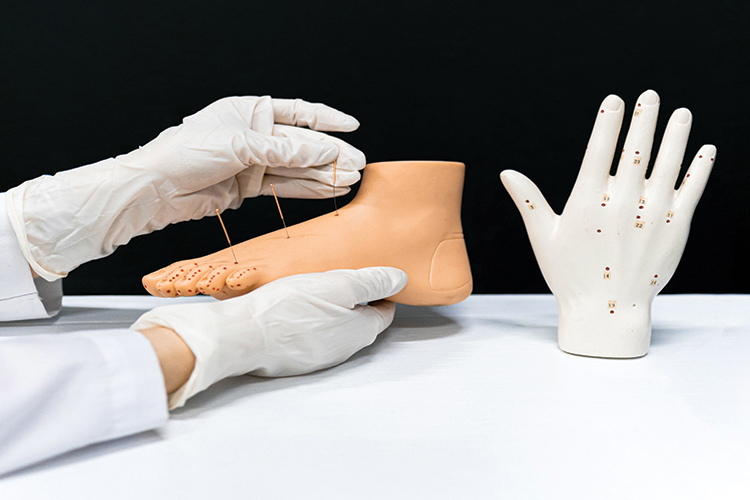This post is also available in:
Español (Spanish)
Français (French)
What is acupuncture?
Acupuncture is a traditional form of Chinese medicine that uses fine needles inserted into the skin to help the body heal.
How does acupuncture work?
Although we are still trying to understand how it works, studies show that acupuncture can improve the body’s ability to heal. For pain, acupuncture helps the body produce its own natural pain killers, called endogenous opioids. Acupuncture also can change how the body interprets pain signals in the spinal cord and brain.
According to traditional Chinese medicine philosophy, the body is ill or sick when there is imbalance in the body’s life energy, or qi. Acupuncture can help balance the flow of qi within the body.
What can acupuncture be used for?
Acupuncture can be used to treat pain, nausea, and mild anxiety, among many other conditions.
What does acupuncture feel like?
Some patients feel a slight scratch or prick of the skin when the needles are inserted; some patients do not feel the needles at all. When the needles are in the skin, a dull ache at the needle site can be normal.
Is acupuncture safe for kids?
Acupuncture is safe for children. The most common side effects are slight bruising and discomfort when the needles are inserted.
Similar to other needle procedures, some patients may feel light-headed with acupuncture. To help prevent light-headedness, first-time patients can receive their acupuncture treatment while lying down. Acupuncture should be used with caution in patients who are on medications that suppress their immune system or patients with bleeding disorders.
What is the difference between acupuncture and acupressure?
While acupuncture uses needles inserted into the skin, acupressure uses pressure applied to specific areas of the body. The pressure is usually applied by hand or another body part, but acupressure seeds or other specialized tools can also be used. You can discuss with your provider which treatment is best for your child.
What is auriculotherapy?
Auriculotherapy is a type of acupuncture or acupressure that is applied specifically to the ear. The ear’s surface is thought to contain a small representative system, or map, of many body systems and organs.
Auriculotherapy can be used for irritable bowel syndrome. Treatment can be used regularly for ongoing management as needed.
How can I get acupuncture therapy?
The best way to get acupuncture therapy is by finding a licensed acupuncturist. Some, but not all, acupuncturists work with children, so be sure to check the provider’s experience with children. If your child has a fear of needles, there are still many techniques and therapies that can be used. You can ask your pediatrician or gastroenterologist for further assistance finding a qualified provider.
Authors: Ann Ming Yeh, MD and Rachel Borlack, MD
Editor: Amanda Deacy, PhD
June 2022
This post is also available in:
Español (Spanish)
Français (French)






